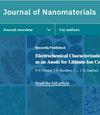Insight into Perovskite Solar Cell Formation for Various Organohalides Perovskite Precursors in the Presence of Water at the Molecular Level
4区 材料科学
Q2 Materials Science
引用次数: 0
Abstract
Recently, hybrid (organic–inorganic) metal halide perovskites have gained significant attention due to their excellent performance in optoelectronics and photovoltaics (PV). Single-junction PV cells made from these materials have achieved record efficiencies of over 25%, with the potential for further improvement in the future. The crystal structure of organohalide perovskite semiconductors plays a crucial role in the success of perovskites. In this study, we used classical all-atom molecular dynamics simulations to investigate the dynamics of ionic precursors as they form organic halide perovskite units in the presence of water as a solvent. During the analysis of radial distribution functions, interaction energies, hydrogen bonding, and diffusion coefficients, it was confirmed that organic precursors aggregate in the absence of water and disperse in the presence of water. The interaction energies also showed that the organic precursors of the perovskite have weaker interactions with Pb than the other components of the perovskite. The hydrogen bonding analysis revealed that the number of hydrogen bonds between the organic precursors and Cl decreases in the presence of water, but hydrogen bonds form between the organic precursors/water and Cl/water. Additionally, the diffusion coefficients of the organic precursors were found to be in the following increasing order: 2,2-(ethylenedioxy) bis ethylammonium (EDBE2+) < guanidium (GA+) < phenethylammonium (PEA+) < iso-butylammonium (Iso-BA+).不同有机卤化物钙钛矿前体在水的存在下在分子水平上形成钙钛矿太阳能电池
近年来,杂化(有机-无机)金属卤化物钙钛矿因其在光电子学和光伏(PV)领域的优异性能而受到广泛关注。由这些材料制成的单结光伏电池的效率达到了创纪录的25%以上,并且在未来有进一步提高的潜力。有机卤化物钙钛矿半导体的晶体结构对钙钛矿的成功起着至关重要的作用。在这项研究中,我们使用经典的全原子分子动力学模拟来研究离子前体在水作为溶剂存在下形成有机卤化物钙钛矿单元的动力学。通过对径向分布函数、相互作用能、氢键和扩散系数的分析,证实了有机前驱体在无水时聚集,有水时分散。相互作用能还表明,钙钛矿有机前驱体与Pb的相互作用弱于钙钛矿的其他组分。氢键分析表明,有水存在时,有机前驱体与Cl之间的氢键数减少,而有机前驱体/水与Cl/水之间形成氢键。有机前驱体的扩散系数依次为2,2-(乙二氧基)二乙基铵(EDBE2+) <胍(GA+) <苯乙基铵(PEA+) <异丁铵(Iso-BA+)。
本文章由计算机程序翻译,如有差异,请以英文原文为准。
求助全文
约1分钟内获得全文
求助全文
来源期刊

Journal of Nanomaterials
工程技术-材料科学:综合
CiteScore
6.10
自引率
0.00%
发文量
577
审稿时长
2.3 months
期刊介绍:
The overall aim of the Journal of Nanomaterials is to bring science and applications together on nanoscale and nanostructured materials with emphasis on synthesis, processing, characterization, and applications of materials containing true nanosize dimensions or nanostructures that enable novel/enhanced properties or functions. It is directed at both academic researchers and practicing engineers. Journal of Nanomaterials will highlight the continued growth and new challenges in nanomaterials science, engineering, and nanotechnology, both for application development and for basic research.
 求助内容:
求助内容: 应助结果提醒方式:
应助结果提醒方式:


